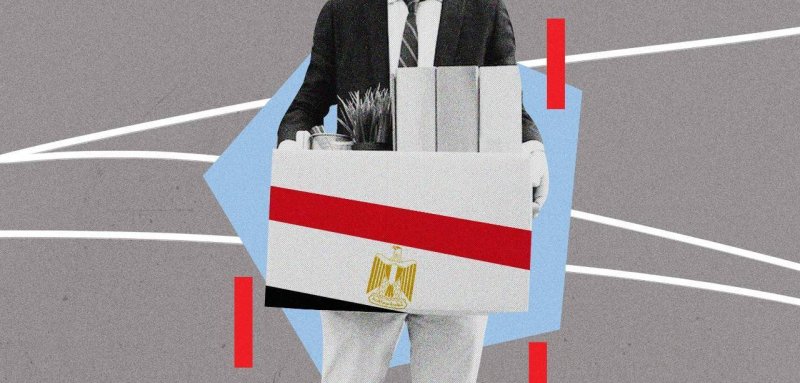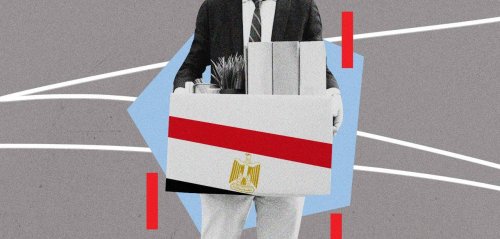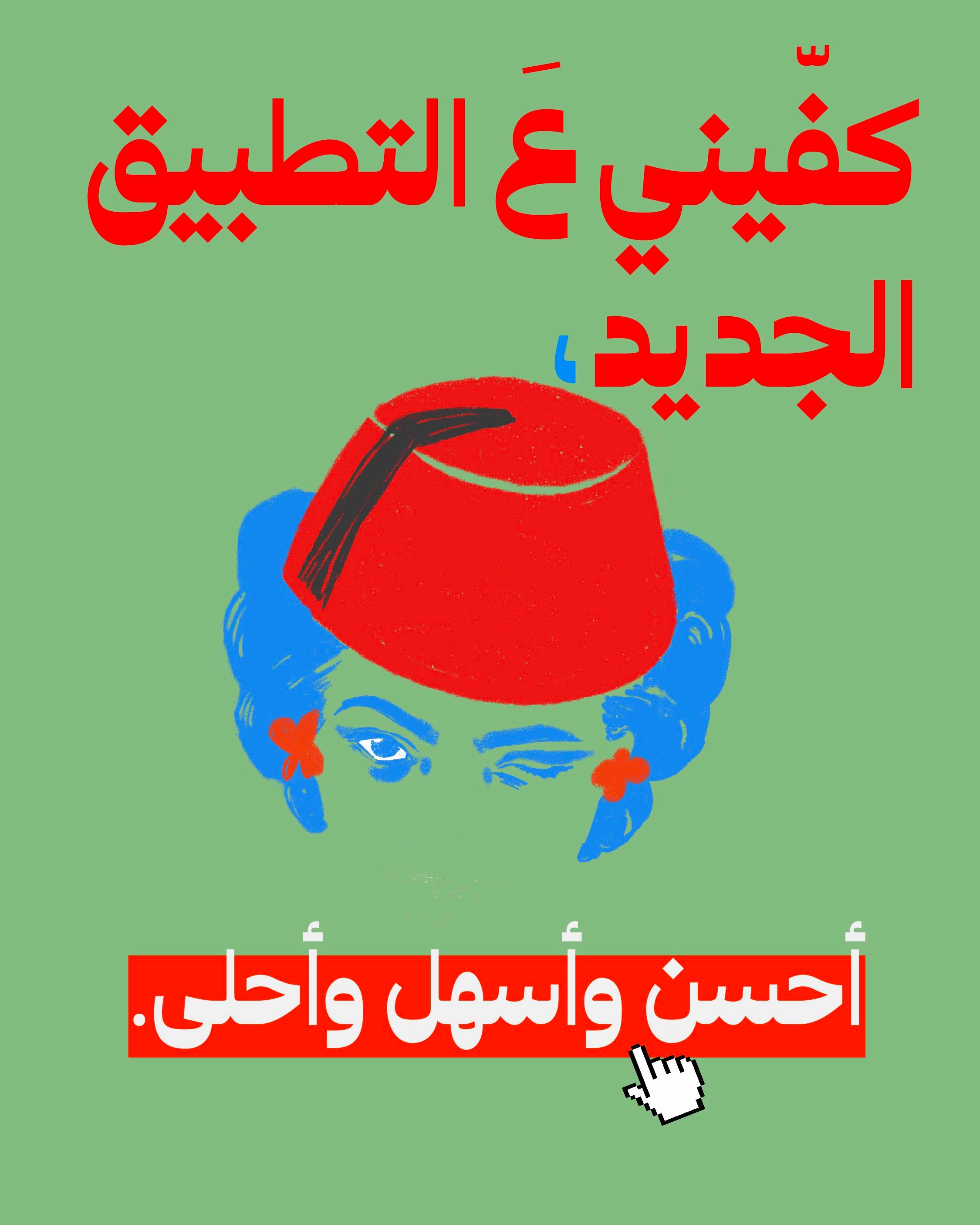Member of Parliament Abdel Fattah Yahya and representative from the pro-authority ‘Future of the Nation Party’ (also known as the ‘Nation’s Future Party’ or the ‘Mostaqbal Watan Party’) announced his intentions to submit a bill requiring the dismissal of those found to be affiliated with the Muslim Brotherhood —classified as a terrorist organization — from the state’s administrative apparatus. The announcement came following statements made on April 26 by Minister of Transport Kamel al-Wazir before parliament, where the official accused “Brotherhood components and elements” of causing accidents in the railway, noting that the solution is the presence of “a legislation that dismisses Muslim Brotherhood members from service.”
The text of the draft law violates established legislative rules that stipulate punishment isn’t imposed until charges are proven, since the bill causes implementing the penalty (dismissal from work) to precede identifying the accused’s affiliation with the Muslim Brotherhood
The proposed bill stipulates that “anyone suspected of being a member of the terrorist Muslim Brotherhood should be suspended and excluded until investigations by the administrative prosecutor’s office are conducted and completed, as well as the dismissal of anyone who publishes false news or misleading rumors calling for incitement and disruption of production through social media platforms.” This violates the established legislative rules that stipulate that the punishment should not be imposed until after the charges have been proven, since the draft law causes the implementation of the penalty (dismissal from work) to precede completing the investigation and establishing the affiliation of the accused / employee with the Muslim Brotherhood. It also sets a legal precedent in Egypt by way of imposing the penalty of dismissal from work due to political affiliation. In the past, authorities were content with merely suspending employees, transferring them to other jobs or remote places, or denying them promotions on other official charges that do not include political affiliations.
The draft bill also dictates that “It is not permissible for those who have already been charged in cases affecting honor and trust — if they belong to the Muslim Brotherhood — to return to work after the expiration of their sentences.” The law was published in the Official Gazette [Egypt Government Services Portal], which is considered a violation of the rules of legislation that stipulate equality of punishment if the crime is equal.
Article 60 of the Egyptian Constitution states, “the human body has its sanctity... no medical or scientific experiment may be conducted on it without its free documented consent, in accordance with established foundations in the field of medical sciences …”
Inspection Laws
“This law is considered a return to the era of inquisitions (ethical inspections) that used to occur during the time of the European Church.” This is how lawyer Tarek Khater described the situation, telling Raseef22 that a person’s beliefs or affiliation with a particular group or ideology is not a breach of employment.
Violations (or infractions), as Khater says, “have two main parts: the first is physical, which is when a person actually does something that is tangible and on the ground. However, contemplating an infraction or lurking is not considered a violation. As for the second part, it is a moral one. If the crime is realized on the ground and in reality, the person will be held accountable for his/her act.”
Khater adds that the judiciary is authorized to prove the charge of belonging to a terrorist group “with my full reservation on trials,” — as he put it — but if we accept the rulings of the judiciary, it is not permissible to leave proving the affiliation of a person who works in a government institution or a report issued by a person who may have a connection with security.
Article 65 of the Egyptian Constitution states that “Freedom of thought and opinion is guaranteed. Every person has the right to express his/her opinion through speech, writing, photography, or via other means of expression and publication.” Khater uses this article to conclude the proposed draft law to be inconsistent and contrary to the principles of the Egyptian Constitution, which stipulate freedom of belief, asking: “How do you debate with a law that contradicts your constitution in the first place?”
Khater sees that the timing of the draft’s proposal was originally wrong to begin with, adding, “How is this proposal being discussed now in light of the COVID-19 pandemic? If this proposal is implemented and any of those who are affiliated are dismissed, the parliament and the government will push people into economic destitution, because the social implications of this law will be very grave for the family of the person that will be dismissed from his job.”
Human rights lawyer Yasser Saad — an attorney at the Legal Cooperation to Support Labor Awareness — agrees with him, saying, “There is nothing in the law that stipulates or provides for the dismissal of a person who is found belonging to a particular group. And in order for a person to be proven a terrorist and labeled under such a status, a judgement must be issued by the supreme Court of Cassation — the highest judicial authority in Egypt — and that is if we fully agree on,” as he puts it, “the fairness of trials.”
Saad informed Raseef22 that, “As long as the employee performs his work completely, the employer does not have the right to issue an order of dismissal, except in the case of committing a crime that violates honor and trust.” However, Saad returns to amend, “The idea of honor and trust is a very flexible one and has no fixed rules.”
Subsequently, the Egyptian parliament approved — in principle — a draft law proposed by the government aimed at dismissing employees that have been proven to be consuming drug-related and narcotic substances. The government-sponsored bill included workers from state administrative apparatus, public sector companies, public business sector companies, as well as companies operating in the management of public utilities, nursing homes, shelters, sanctuaries, placement and rehabilitation homes, nurseries, schools, and private hospitals.
The law stipulates that it is required for the recruitment, contracting, hiring, or the continuation of the public positions in the state to prove that drugs were not being used or consumed through a surprise drug screening or test conducted by the competent authorities.
Article 60 of the Constitution states that, “The human body is inviolable, and assaulting it, mutilating it, or maiming it is a crime punishable by law. The trading or trafficking of its organs is prohibited, and no medical or scientific experiment may be conducted on it without its free documented consent, in accordance with established foundations in the field of medical sciences, and as regulated by law.”
Lawyer Yasser Saad said that the law for the dismissal of those that are found to be drug users contradicts the Egyptian constitution, which stipulates that medical experiments or tests can only be conducted after free consent is given, and this will not be the case since employees will be forced to take the test. This is stipulated in Article 4 of the same law stating that, “clearly refraining from taking the test, or deliberately evading it without an acceptable excuse is a binding reason for terminating the worker’s service.”
The law has also raised concerns that this could all be a ploy by the government to empty the state’s administrative apparatus of staff in order to reduce their numbers as part of its agreement with the International Monetary Fund (IMF) in light of the agreed-upon economic reform program — dubbed the ‘National Structural Reform Programme’ (NSRP).
This was referred to by MP Sanaa al-Saeed, who expressed her fear of this law and said that it may have been prepared to get rid of the workers in the state’s administrative apparatus. She also expressed her concern regarding the draft law’s suspicious lack of constitutionality.
Yasser Saad, for his part, considers the law “void” or invalid, because drug use without any supervision is not a crime in accordance with the Penal Code. And as long as the employee performs his work duties to the fullest and does not use drugs while he is at work, the employer — which is the government in this case — has no right to dismiss him based on what he does in his private life.
He added that the decision to dismiss an employee because of his/her affiliations or drug use must be issued by the Public Prosecutor’s Office following a full-fledged investigation into a criminal offence, and not the administrative prosecutor’s office, as defined by the law regarding the dismissal of those found to be affiliated with the Muslim Brotherhood. This is due to the fact that the administrative prosecutor’s office does not have the authority to directly investigate the actions of an employee outside the framework of his work. Rather, its authority is strictly related to job duties and responsibilities, in case the employee errs in a technical task related to the position itself.
Attorney Tarek Khater supported Saad’s opinion and said that the law regarding the dismissal of drug users violates personal freedoms and mixes the public with the private. He goes on to add, “The state has the right to hold a person accountable if it is found that he has taken drugs while on the job. But as long as the employee comes to the place of employment at his full work potential, why is he held accountable for that?”
Regarding this legal debate, Khater sees that the legislations passed in parliament are “supreme” legislations that are not discussed in Egyptian parliament in the first place, or even through community dialogue. Rather, they come down via “parachute” and are then issued and ratified by the President, as he put it.
رصيف22 منظمة غير ربحية. الأموال التي نجمعها من ناس رصيف، والتمويل المؤسسي، يذهبان مباشرةً إلى دعم عملنا الصحافي. نحن لا نحصل على تمويل من الشركات الكبرى، أو تمويل سياسي، ولا ننشر محتوى مدفوعاً.
لدعم صحافتنا المعنية بالشأن العام أولاً، ولتبقى صفحاتنا متاحةً لكل القرّاء، انقر هنا.



